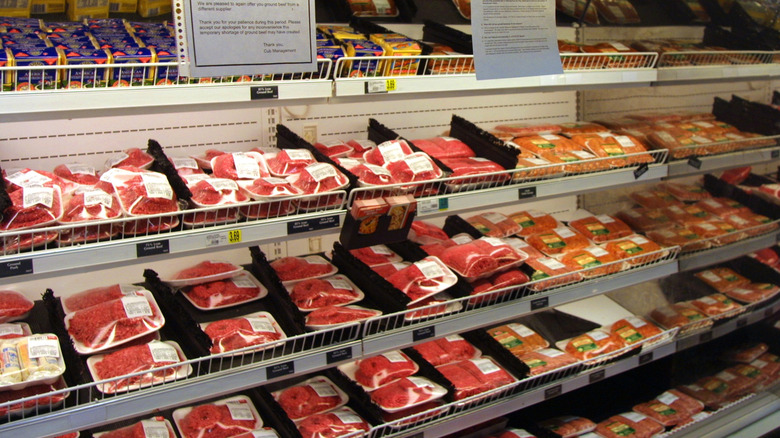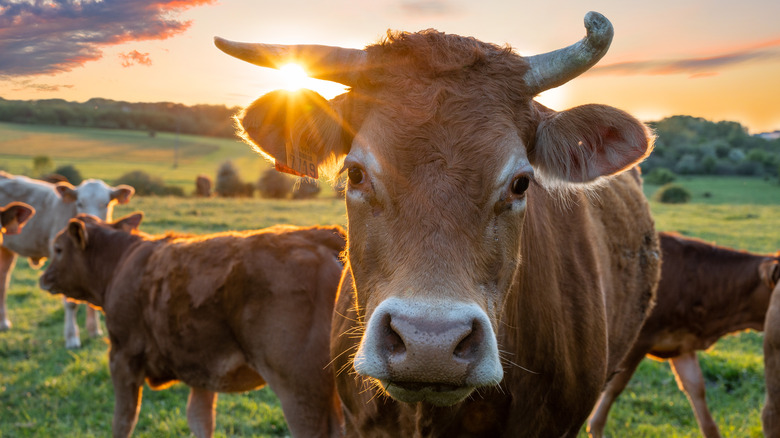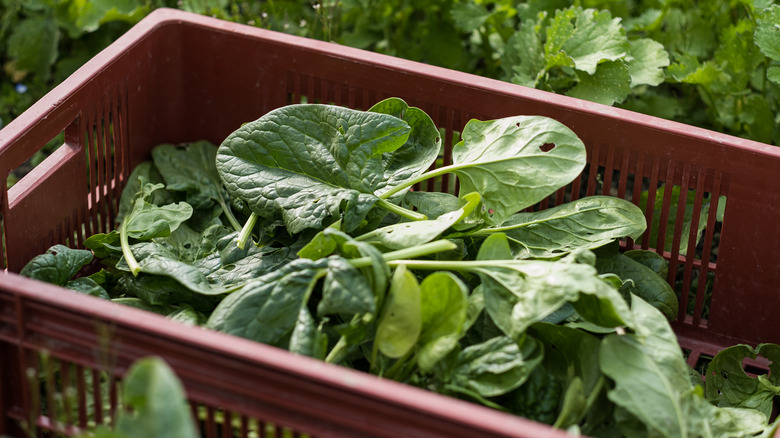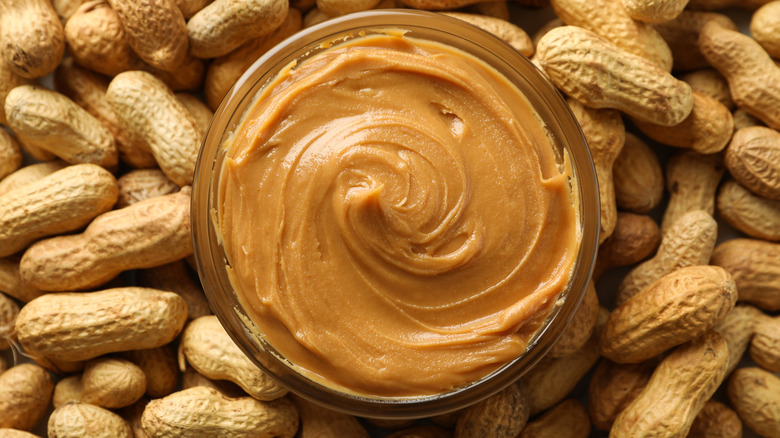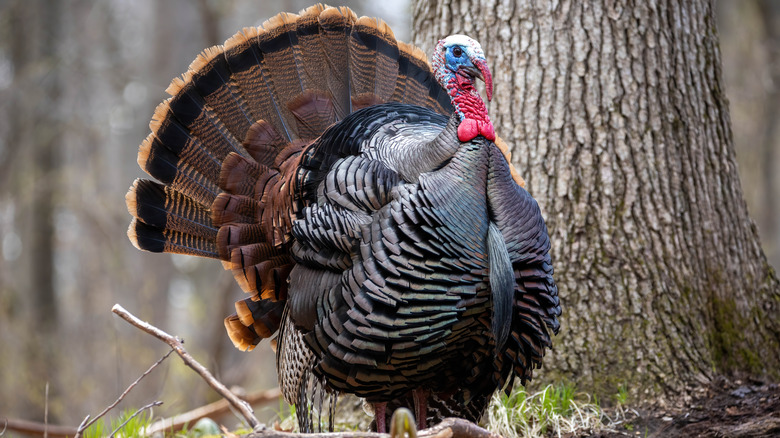11 Biggest Food Recalls In History
Food safety is a tricky and ever-changing business. Whether dealing with livestock, dairy, or fruits and vegetables, when producers don't take caution, it can cause mass sickness or even deaths (via Food Insight). Although food poisoning might seem mild, and common –- it happens to roughly one in six people every year -– dangerous bacteria like E.coli and salmonella lurking in contaminated food can be downright deadly, as the CDC reported. And the dirty, hazardous, and even illegal conditions inside some factories and farms are shocking to customers, who rarely get a glimpse behind the scenes until there is a recall.
As history shows, heeding food recall alerts can keep you healthy and out of the hospital (via U.S. PIRG). From peanut butter to melons to ground turkey, no food is 100% guaranteed to be safe from unsanitary factories and lax safety standards.
In 2011, the Food and Drug Administration passed the Food Safety Modernization Act after some particularly egregious food recalls. Here are just a few examples of some of the most widespread and impactful food recalls in history.
Sara Lee beef recall
According to The New York Times, the Sara Lee meatpacking company had to recall millions of pounds of meat in 1998. They discovered a dangerous bacteria, listeria, which caused 101 people to get sick and 15 deaths after eating contaminated hot dogs and deli meat slices (via Convenience Store News).
Controversy swirled after it was revealed that Sara Lee higher-ups had already known about the risks of listeria since the previous year (via The Washington Post). As The Chicago Tribune reported, they were subjected to a multi-million-dollar class-action lawsuit when it was found that their factories were breeding grounds for bacteria.
When they visited the Bill Mar factory in Michigan, inspectors found a cockroach infestation and old scraps of meat strewn around the factory. Sara Lee ended up spending $25 million to clean up and renovate their plant and was charged with a misdemeanor. They settled out of court for $4.4 million –- but they made history as the biggest meat recall ever at that time.
The Mad Cow Disease panic
As ABC News reported, the Westland/Hallmark Company meatpacking plant recalled 143 million pounds of beef in 2008, making it the biggest beef recall in history. It started when a video began circulating showing sick cows who could hardly move, being hauled through the southern California factory with chains or a forklift. Rumors of "mad cow disease" spread as the recall affected children's school lunches across the nation -– the company was the biggest ground beef supplier for school lunches at that time.
The company recalled beef dating as far back as early 2006 -– long after most of it would have been eaten. Several companies, like Jack-in-the-Box and In-N-Out, also stopped buying their meat from the company.
After an inspection of the factory, the Food Safety and Inspection Service declared that the cows' meat was "unfit for human food." Upon inspection, they realized that the video of cows being moved in inhumane manners was because the company wasn't calling veterinarians for their sick cattle –- even after they were too sick to walk. Non-ambulatory animals are never supposed to be used for fofsalod, both because of potential illnesses and because they can spread more bacteria because they are lying in filthy conditions.
As for the Westland/Hallmark Company, they went out of a business after the video footage caused public outcry (via Food Safety News). The company also had a largely symbolic $497 million judgment against them after it dissolved, record-setting for an animal abuse case. Animal rights advocates celebrated the successful lawsuit as a victory for both animal and consumer rights.
Wright County/Hillendale Farms egg recall
This recall of some 500 million eggs changed food safety forever, after nearly 2,000 people became sick with salmonella poisoning from Wright County/Hillendale Farms eggs in 2010 (via Marler Clark Law Firm). The CDC reported that there were more than double the amount of salmonella-related illnesses just before the recall.
When the Wright County/Hillendale farm was examined by taking hundreds of samples, the conditions were shocking. Salmonella was detected in 24 sources around the farm, including in their feed, as the Center for Infectious Disease Research and Policy notes, which poisoned their eggs. Between 2008 and 2010, 426 positive salmonella cases were reported at the Iowa factory.
There were 29 restaurants who had served up tainted eggs, and the bulk-packaged eggs had already been distributed to grocery stores. While the company ultimately voluntarily recalled half a billion eggs, it was too late for many people, because the eggs had already passed their expiration date.
It was revealed that in 2009, the facility's owner had previously paid millions of dollars in fines after mistreating chickens on his farm — like an incident in 1996 of a worker scooping up dead chickens with his bare hands (via ABC News). According to The Atlantic, the FDA had just introduced new safety regulations on shell eggs a month prior to the recall. And Wright County/Hillendale had to make vast improvements to their sanitation habits to prevent another outbreak.
Deadly spinach recall
As the USDA ERS reported, there was a massive spinach recall in 2006, with deadly consequences. Spanning 26 states, 204 people got sick after eating spinach contaminated with E.coli bacteria. Thirty-one of those people developed a type of kidney failure called hemolytic-uremic syndrome, which can be fatal. Three people, including one child, died as a result of the contaminated food, as per the CDC.
The FDA acted fast and in a dramatic fashion, recalling every single spinach product in the U.S. and advising that no one should eat any bagged spinach. After an investigation, it was determined that the contaminated spinach was grown next to a field of pigs and cattle, and their feces had spread to the spinach field, according to the USDA.
After sales of lettuce and other leafy greens grew rapidly while no one bought spinach, spinach growers sprang into action to ensure safer products for future consumers (via the USDA). By 2007, a majority of the California spinach farms had agreed to new safety rules.
General Mills flour recall
A General Mills flour plant in Missouri was ground zero for an E.coli outbreak in 2016 –- and 45 million pounds of flour were recalled, through three separate recalls (via Food Safety News).
As the CDC reported people were affected in 24 states -– 63 people became sick, and 17 people were hospitalized, with some suffering hemolytic uremic syndrome, a type of kidney failure that can be deadly. The first recall was for 10 million pounds of flour in May, followed soon after by two in July, for 20 million and 15 million pounds, respectively.
Unlike with perishable goods like eggs or meat, flour stays good for a long time, and unaware consumers continued to bake with it if they hadn't heard the news. Plus, General Mills said they sold their flour for other uses like prepackaged cake mixes.
Townsend food pomegranate scare
In 2013, frozen pomegranate seeds were found to contain Hepatitis A (via Food Safety News), which can cause liver damage for those who are unvaccinated against the illness, according to the CDC. While there were no deaths, in 10 states, 165 people got sick, as CBS reported, and 71 had to go to the hospital.
Townsend Farms, based in Oregon, voluntarily recalled the frozen berry mix containing the pomegranates in June 2013, noting that fresh pomegranates and other berry products were not affected. After an investigation, the tainted pomegranates could be traced back to Turkey.
Hepatitis A is usually spread through fecal contamination. Rates of hepatitis have decreased by 95%, since a vaccine was created in 1995 (via CBS). Regardless, stores like Costco and Kroger advised that anyone who bought the frozen berry blend "health food" should throw it away and seek treatment.
Pet food recall
Canadian-based pet food company Menu Food was responsible for making thousands of animals sick with contaminated wheat gluten in their food in 2007, reported Reuters. There were some 10,000 complaints of pet illnesses and 14 deaths, as per Investopedia. The result was that 60 million cans of wet cat food and wet dog food brands were recalled across a variety of products.
Throughout about three months in 2006 and 2007, more than 800 tons of contaminated wheat gluten was imported to the U.S., reported the FDA. An industrial chemical ingredient called melamine, usually used as an additive to plastic products, had been added to the wheat gluten ingredient. It was causing dogs and cats to go into kidney failure.
With this recall, pet owners sought justice. As Reuters reported, the company said that it was inundated with 300,000 phone calls following the incident. Menu Foods quickly cut ties with the Chinese company that sold them the plastic-contaminated ingredients and said they would be "following up" with the incident.
As the FDA reported, seven responsible parties in China and the U.S. were charged and indicted with counts of delivering adulterated or misbranded food.
Jensen Farms cantaloupe contamination
A Colorado-based food facility, Jensen Farms, was to blame for a 2011 batch of tainted cantaloupes that were housing listeria. After eating the contaminated melons, 147 people got sick, 33 people died, and one woman had a miscarriage (via The United States Attorney's Office). It was a devastating failure –- as USA Today reported, the FDA claimed that this was the "deadliest foodborne illness outbreak in the USA since 1924."
Cantaloupes are often not washed before they are sliced up and eaten, so the exterior germs can spread to the inside of the fruit. The issue at Jensen farms stemmed from workers who walked through puddles that contained listeria germs, spreading it throughout the cantaloupe washing area. The fruits then weren't properly dried, increasing the risk even more. The New York Times reported that pieces of equipment and storage locations tested by the FDA had the bacteria, but by that then, the fruit had been purchased by folks in 28 states.
Eric and Ryan Jensen, the Colorado facility's owners, pleaded guilty to six misdemeanor charges of bringing adulterated food into other states, along with criminal aiding and abetting (via The United States Attorney's Office). While they avoided jail time, the brothers received five years of probation. They also had to pay a restitution and complete 100 hours of community service. The Denver Post reported the company filed for bankruptcy due to lawsuits from the outbreak.
Hillfarm Dairy milk recall
One of the earliest mass salmonella outbreaks happened in 1985. Affecting Americans in six states, nearly 18,000 people felt ill after drinking salmonella-contaminated milk from Hillfarm Dairy in Illinois, as per the AP.
As The Chicago Tribune reported, after thousands of people got sick and one died, 2% milk was rapidly recalled and pulled from store shelves. The recall was big news for the northern Illinois community -– dozens of people called into local news stations to share their stories of getting sick and to spread warnings to others.
The facility ended up having to issue two separate recalls -– the first was just for 2% milk, but by the second recall, the facility said consumers should not drink any milk products from the brand (via the Chicago Tribune). As The New York Times reported, the problem was never officially declared but could probably be attributed to an illegal valve that mixed raw and pasteurized milk together. Within months, the dairy was shut down permanently.
Peanut Corporation of America controversy
Between 2008-2009, the Peanut Corporation of America was responsible for nearly 4,000 peanut butter and peanut paste products becoming contaminated with salmonella, resulting in 714 people becoming sick and nine deaths (via CDC). People in 46 states were affected. The conditions at their Georgia facility were quite poor. Inspectors found a roach infestation, a rodent problem, and leaking roofs, reported USA Today, all of which can spread salmonella throughout the plant.
This was no ordinary recall. The owners of the plant, the Parnell brothers, were reportedly aware that their peanut butter contained salmonella before they shipped it to big-name brands, like Kellogg's. The plant actually faked negative salmonella screenings, which was later uncovered in email chains and other receipts.
The former leader of the peanut company, Steve Parnell, was sentenced to 28 years in prison for conspiracy and obstruction of justice charges, reported USA Today. A quality control leader received five years in prison for her role in the proceedings.
The corruption was so blatant that as Food Processing reported, the 2011 Food Safety Modernization Act was devised partly because of it. President Barrack Obama spearheaded the effort, with the aim of preventing outbreaks before they occur instead of just reacting to recalls after the fact.
Cargill Meat Solutions Corporation turkey meat recall
In August 2011, Cargill Meat Solutions Corporation recalled 36 million pounds of turkey after drug-resistant salmonella was discovered in an Arkansas factory (via The New York Times).
One person died, and 129 were sickened after eating contaminated meat. Cargill had to recall another 185,000 pounds of turkey just weeks later in September 2011 (via NBC News). People continued to get sick from eating turkey meat that they had stored away without realizing it came from the contaminated batches.
According to The New York Times, federal data shows that about 10%-15% of turkey meat already contains salmonella. But this strain of salmonella was particularly dangerous, because it was resistant to several of the leading antibiotic treatments available.
The Cargill plant that was responsible for the outbreak was shut down for an entire week for cleaning, as NPR reported. And they also sought out an independent panel of experts to reexamine the company's food safety processes -– as one of the three biggest turkey producers in the country, the company had to take food contamination very seriously.
The future of food safety
Per the CDC, there are at least 250 foodborne diseases caused by parasites, bacteria, and viruses that can hide in our food –- causing an estimated 48 million people worldwide to get food poisoning or other food-related illnesses. In order to prevent some 3,000 annual deaths, the FDA consistently updates its food safety regulations.
The Food Safety Modernization Act signed into law by Barrack Obama was just one regulation added. New rules help keep everyone safer, whether it's through self-regulation or compliance to FDA standards.
But as Food Processing reported, from 2004-2013, recalls have nearly doubled. There are more contaminations due to allergens, as well as the usual strains of salmonella and listeria. But this is probably due to stricter regulations around testing, which is catching more bad food before it sickens or kills people.
It can be easy to tune out a constant stream of recalls, but it's important to pay attention and find any tainted food that could be hiding in your fridge or freezer. With every recall, companies have to tighten their standards to keep their name in good standing and continue to operate.

